Extremely powerful Wi-fi transmitter for businesses
Choosing a router for the corporate network is a serious job. While offices or small businesses may not need a network that runs too fast or up to standard, larger offices and businesses need special routers to handle high traffic and security needs.
Instructions for choosing to buy routers for businesses
- Factors to consider when choosing to buy routers for businesses
- Wi-Fi Protocol (Wi-Fi Protocol)
- Supported bands
- Speed
- Range
- Advanced features
- The difference between an enterprise router and a home router
- Leading routers for small and medium enterprise networks
- 1. Linksys AC5400
- 2. Nighthawk X10
- 3: TP-Link AC3200
- 4. ASUS AC5300
- 5. TRENDnet AC3200
- Routers for large businesses, IT
- Cisco enterprise routers
- Juniper Router
- HPE router
- Dell router
- Router Nokia
- AVAYA Router
Factors to consider when choosing to buy routers for businesses
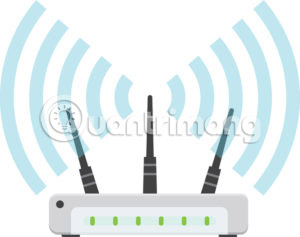
When choosing to buy a router, you need to learn all the relevant terms. To help you choose the best, most suitable router, the article has broken down really essential features as follows:
Wi-Fi Protocol (Wi-Fi Protocol)
This is the sequence of numbers and letters that begin with the word 802 associated with the router. The wireless protocol defines the maximum theoretical bandwidth and range that the router can support.
Typically, businesses will search for routers with 802.11ac protocol. This protocol is sometimes called Gigabit Wi-Fi because it supports speeds up to 1.3Gbps (theoretically). Gigabit Internet connections are becoming more popular and the benefits it brings will be proven in the future.
There is a newer protocol, called 802.11ad, that is three times faster than 802.11ac. But the 802.11ad standard is new and there are very few routers (as well as many computers and Internet service packs) that support this type of bandwidth. So while 802.11ad is technically the best, at the moment they are not really necessary.
Supported bands
Routers often come with terms such as dual-band or tri-band. The band refers to the number of radio bands that the router receives. There are two common bands used are 2.4Ghz and 5Ghz. 2.4Ghz is a slower frequency band that older wireless standards like 802.11n use. The 802.11ac protocol works with the 5GHz band.
Most routers today are dual-band, meaning they support both the 2.4Ghz and 5GHz bands, enabling higher speeds (theoretically), more stable connectivity and less network congestion. Many new routers are tri-band routers, supporting a 2.4Ghz band and 5GHz band.
Technically, multi-band routers will be better, but the difference between dual-band routers and triple-band routers may be difficult to see in certain environments.
Speed
The higher maximum speed on the router will allow multiple devices to use the network at the same time without being slow. However, keep in mind that the Internet connection still needs to provide bandwidth and the router can only use the amount of bandwidth available. That is, choose a high-speed router if the Internet connection is capable of responding.
Range
The scope of a router is important if you plan to use only one router in the office. But most businesses will want to have multiple routers in the network. This ensures Wi-Fi signals cover the entire office space and have enough bandwidth for many users simultaneously. Although technically, more than 200 devices can be connected to a router, but surely the Wi-Fi speed will be very slow.
Advanced features
In addition to the basics, there are some features commonly found in business routers that readers should note:
- Quality of Service (QoS) : QoS is a feature that allows you to prioritize certain types of traffic on the network. This is very important if the network is frequently blocked. For example, when there is too much traffic, important applications such as VoIP for video calls, may be interrupted when someone plays Netflix online at the break.
- Integrated VPN server : Virtual Private Network server (VPN) provides a secure, private network for businesses, by encrypting all traffic. This provides an enhanced security layer for sensitive business information. Many enterprise-class routers include a VPN server.
The difference between an enterprise router and a home router
The main difference between the enterprise router and the home router is the security features. Business routers often include integrated security monitoring and VPN servers to enhance security. They are usually dual-band routers to provide the maximum amount of bandwidth for many users. In terms of features, home and business router routers have many similarities.
If you only need to access the Internet in a small office, a small network setup similar to your home is enough. However, when office size and network usage are wider, data and information become more important and sensitive, you should probably choose a router system that has many features for businesses only. than.
Leading routers for small and medium enterprise networks
Choosing a router can be an extremely difficult task for people who don't have much knowledge. If you're not a network engineer, you may have to spend many days understanding different terms and products. But don't worry, today's article will suggest the top 5 routers on the market today for enterprise networks. Along TipsMake.com find out soon here!
1. Linksys AC5400
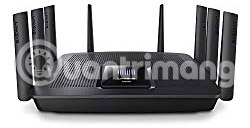
- Number of antennas: 8
- Speed: Up to 5.3Gbps
- Ports: 8 gigabit Ethernet ports
- Protocol: 802.11ac
- Band: Three bands (one 2.4GHz band and two 5GHz bands)
- Size: 5.4 ″ x 14.3 ″ x 11.7 '' / 3.3 lbs (14cm x 36cm x 30cm)
- Other features: Advanced security features, integrated firewall, Beamforming technology.
Linksys AC5400 is a powerful tri-band router with a maximum bandwidth of 5.3 Gbps. This router provides more Ethernet ports than all other routers on this list, perfect for extending networks or connecting critical devices for more stable network signals. But it has a disadvantage that is quite expensive.
2. Nighthawk X10
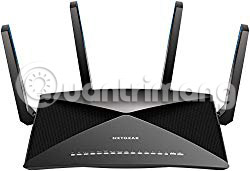
- Number of antennas: 8
- Speed: Up to 7.2Gbps
- Port: 6 gigabit Ethernet ports, 1 10 gigabit Ethernet fiber port
- Protocol: 802.11ac, 802.11ad
- Band: Three bands (one 2.4GHz band; one 5GHz band and one 60GHz band)
- Size: 6.6 ″ x 8.8 '' x 2.9 '' / 4.1 lbs (17cm x 22cm x 7.5cm).
- Other features: Beamforming technology, advanced antenna technology, support for VPN, support for 802.11ad standard for ultra-fast wireless speeds
Nighthawk has become a big name in the field of router manufacturing in the past few years and X10 is helping Nighthawk continue that tradition. This router is equipped with the latest Wi-Fi standard: 802.11ad. This protocol allows Wi-Fi speeds to be three times faster than 802.11ac. Combined with a tri-band system, the Nighthawk X10 can support speeds up to 7.2Gbps. That makes it the fastest router on the list today. Unfortunately, 802.11ad has not been widely supported on devices yet, so it will take some time before users can really take advantage of all the power that the Nighthawk X10 brings.
3: TP-Link AC3200
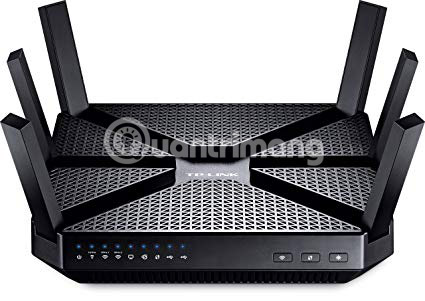
- Number of antennas: 6
- Speed: Up to 3.2 Gbps
- Port: 4 gigabit Ethernet ports
- Protocol: 802.11ac
- Band: Three bands (one 2.4GHz band; two 5GHz bands)
- Size: 7.9 ″ x 7.9 '' x 1.5 '' / 3.1 lbs (20cm x 20cm x 4cm).
- Other features: Support for QoS, integrated VPN, mobile application, Smart Connect technology (Smart connection).
The AC3200 router from TP-Link provides many interesting features. It has a tri-band router that supports connection speeds up to 3.2Gbps. This is not the strongest router on this list, but it still provides users with plenty of bandwidth. It has 6 antennas that can be moved to find the best connection, 4 Ethernet ports to extend the network range and an integrated VPN server to maximize security. With prices below $ 300 (VND 6.9 million), this product is very suitable for a small business.
4. ASUS AC5300
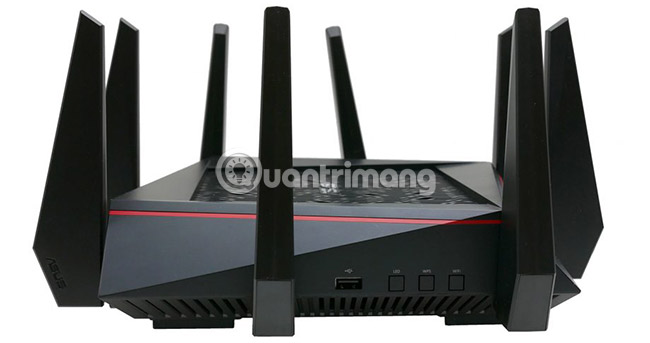
- Number of antennas: 8
- Speed: Up to 5.3 Gbps
- Port: 4 gigabit Ethernet ports
- Protocol: 802.11ac
- Band: Three bands (one 2.4GHz band and two 5GHz bands)
- Size: 24.5 ″ x 24.5 '' x 6.5 '' / 3.2 lbs (62cm x 62cm x 16.5cm)
- Other features: Advanced security features from Trend Micro, wide coverage, mobile applications.
This is a large sized router, so it takes up a considerable amount of space on the desk. However, that 'huge' size makes ASUS AC5300 one of the strongest routers in this list, with a large amount of bandwidth and 8 antennas that can be moved. This is also the best long-range Wi-Fi router thanks to its unique antenna setup.
5. TRENDnet AC3200
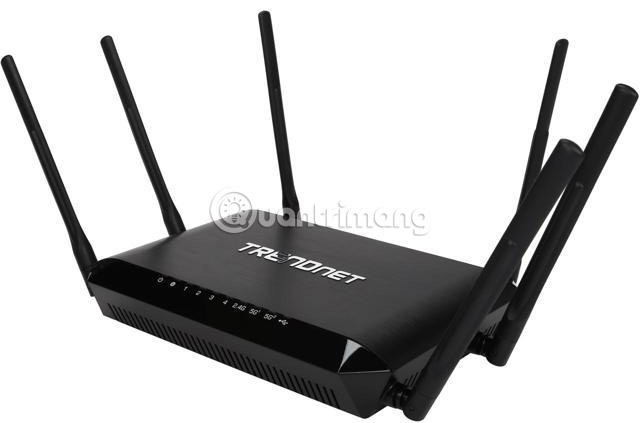
- Number of antennas: 6
- Speed: Up to 3.2 Gbps
- Port: 4 gigabit Ethernet ports
- Protocol: 802.11ac
- Band: Three bands (one 2.4GHz band and two 5GHz bands)
- Size: 13 ″ x 13 ″ x 3 '' / 2.7 lbs (33cm x 33cm x 8cm).
- Other features: Beamforming technology, open source compatibility, Smart Connect technology (Smart connection).
TRENDnet has created a series of affordable routers, including this AC3200 model. This router owns Smart Connect technology, which prioritizes network devices to maximize performance. It is also compatible with open source software, so it can be customized according to the specific needs of each business.
Routers for large businesses, IT
Cisco enterprise routers
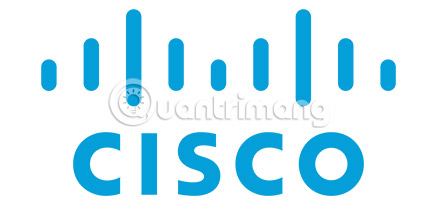
Cisco Systems, one of the leading network companies in the world, specializes in providing routers, switches and other network devices. Cisco enterprise-class devices can help the corporate network be better protected with high security protocols. Cisco routers can help the enterprise network work more accurately, better meet user needs and increase the ability to combine the use of new compatible technologies.
However, it is also because Cisco is a big name in this area, so it also has a lot of routers to choose from. It will be difficult to decide which Cisco router is right for your organization. If you need to interact with the Internet, Cisco's enterprise-class router is a great candidate. The following is a list of Cisco's leading enterprise routers at the present time.
CISCO's Integrated Services routers
CISCO's Integrated Services routers extend the scope for its 'office routers' by integrating multiple system services into a single platform. This is a big improvement over previous routers that require additional hardware to run services.
- CISCO 800 Series ISR
- CISCO 4000 Series ISRM
- CISCO Meraki MX
CISCO WAN Aggregation routers
The WAN Aggregation routers (combined WAN) of CISCO boast outstanding IP along with expandable and customized IP services.
- CISCO NCS 5000 Series
- CISCO NCS 5500 Series
- CISCO ASR 1000 Series
CISCO's Internet router edges
Edge router is the specific router that is located at the network 'boundary', allowing internal networks to connect to external networks. These edge routers are basically used within WAN and web division.
- CISCO ASR 1000 Series
- CISCO ASR 9000 Series
CISCO's Service Provider Core
Advantages of Core Provider is easy to scale in the future.
- CISCO NCS 5500 Series
- CISCO NCS 6000 Series
- CISCO ASR 9000 Series
CISCO industrial routers
Cisco's multi-service industrial routers are very compact and compatible with harsh environments.
- CISCO 800 Series Industrial Integrated Services Router
- Router CISCO 900 Series Industrial
- CISCO 1000 Router Connected Grid series
- CISCO 2000 Series Connected Grid Router
- Router CISCO 500 Series WPAN Industrial
Cisco Integrated Services Virtual routers
Cisco Integrated Services Router (ISR) - Cisco's integrated service router - is part of Cisco Borderless Network Architecture (Cisco's borderless network structure), helping to enhance innovation and business growth in all pages. remote web.
- CISCO IOS XRv 9000
- CISCO CSR 1000v
Cisco routers in this section, along with a brief description of them, give you a chance to better understand which router is the best choice for your business. The main benefit of Cisco routers is security.
Juniper Router

Juniper Networks also designs, develops and markets Information Technology (IT) network products. Juniper holds the third largest market share of routers and switches used by Internet service providers (ISPs). Some of its products include routers, switches, network security products, network management software and IT security products.
One of Juniper's most popular products is the Juniper MX series. The main goal of launching the MX series is to significantly increase the bandwidth for MX routers. Currently, Juniper Mx80 has capacity of 80 GNPS and 2U size (rack unit, 1 rack unit = 44.45 mm). Juniper routers are suitable for all IT environments, providing a safe and scalable portfolio for enterprise routers.
Juniper MX Series
The Juniper MX Series is closely linked to the Software Defined Network (SDN) to provide impressive system capacity, density and performance.
- Juniper Virtual MX (vMX)
- Juniper MX 5
- Juniper MX10
- Juniper MX40
- Juniper MX80
- Juniper MX104
- Juniper MX150
- Juniper MX204
- Juniper MX240
- Juniper MX480
- Juniper MX960
- Juniper MX2008
- Juniper MX2010
- Juniper MX2020
- Juniper MX10003
JunX PTX Series
PTX routers are designed to provide incredible speed, efficient integration and lightweight deployment, which helps reduce costs associated with network ownership.
- Juniper PTX1000
- Juniper PTX3000
- Juniper PTX5000
- Juniper PTX10000
JunX ACX Series
ACX routers adapt to a variety of environments, reducing operating, maintenance and updating network infrastructure costs. Moreover, this series of products makes customers extremely satisfied thanks to its durability.
- Juniper ACX2100
- Juniper ACX2200
- Juniper ACX4000
- Juniper ACX5000
CTP Juniper Series
Advanced technology in the CTP series enables improved transmission time and multiplexing. This technology eliminates point to point circuits (points to points) and instead converts applications into an effective IP network.
- Juniper CTP150
- Juniper CTP2008
- Juniper CTP2024
- Juniper CTP2056
Juniper Router T4000 Core
The Juniper T4000 Core router is designed with a flexible structure that can deliver a wide range of services through common infrastructure and MPLS.
HPE router
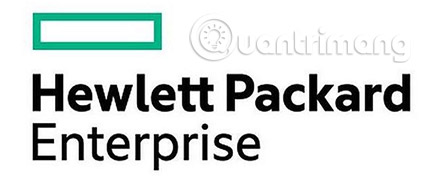
HPE (Hewlett Packard Enterprise) helps customers deploy a range of technologies to get user-friendly cloud services and mobile platforms. HPE provides quality service to customers, changing industries, markets and life. HPE also offers a variety of products related to networking, storage servers and software.
There are two different HPE router series:
- HPE MSR Series
- HPE VSR Series
HPE model routers are high-performance routers, with router devices up to 1MBPS. MSR routers are designed for routing, switching, high security and do not need any additional licenses. All features are included at no extra cost. The price of HPE routers is also very reasonable.
In addition, HPE enterprise router has a very convenient modular design. All MSR routers offer flexible connectivity options, along with enhanced security with integrated firewall protection measures. This router's WAN combines existing features with newly added 4G LTE SIC modules.
The HPE Virtual Service router series has the same functionality as the physical enterprise version, however, it is based on a virtual X86 server.
HPE router models:
- HPE FLexNetwork MSR95x Series
- HPE FlexNetwork HSR6800 Series
- HPE Alcatel-Lucent 7750 Service Series
- HPE PS110 Wireless VPN Series
- HPE R100 Wireless VPN Series
- HPE FlexNetwork MSR1000 Series
- HPE FlexNetwork MSR4000 Series
- HPE FlexNetwork MSR2000 Series
- HPE FlexNetwork VSR1000 Virtual Services Series
- HPE FlexNetwork MSR3000 Series
- HPE FlexNetwork MSR93x Series
- HPE FlexNetwork HSR6600 Series
- HPE FlexNetwork 6600 Series
- HP-FlexU Network Virtual Router Router E-LTU E-LTU
- HPE FlexNetwork VSR1004
- HPE FlexNetwork VSR1008
Aruba is a 'brother' company of Hewlett Packard Enterprise. The company offers mobile controllers, switches, routers and more.
Aruba router models:
- Aruba Series 340
- Aruba Series 330
- Aruba 220 Series
- Aruba Series 210
- Aruba Series 207
- Aruba 200 Series
- Aruba 1030 Series
Dell router

Dell is an MNC IT company, based in the United States, specializing in the manufacture and supply of HDD, Dell router, network switch, PC and other network related products for home and business.
Dell offers the best network-related solutions worldwide, with comprehensive IT services and 24/7 customer support.
In Dell, Layer 3 switches are considered routers. The most popular Dell router is the Dell Networking N-Series router. These N-Series (N series) routers boast energy saving and 1GbE and 10GbE switches, designed to modernize and expand network infrastructure.
1GbE Layer 3 Dell Networking N2000 Series switches
These Layer 3 switches use M-LAG to create different path loops, allowing full bandwidth to be used for redundancy. It also has IPv4 and IPv6 Layer 3 functions, including static routing and Routing Information Protocol (RIP version 1 & 2) for up to 256 interfaces. The N2000 Series has features that provide 48 Power-over-Ethernet Plus (PoE +) ports. Meanwhile, N2128PX-ON supports 4 ports of 60W Power over Ethernet (PoE 60W).
- Dell N2024 Series
- Dell N2024P Series
- Dell N2048 Series
- Dell N2048P Series
1GbE Layer 3 Dell Networking N3000 Series switches
The N3000 Series provides PoE 60W compatible with GbE switches for Layer 3 access with M-LAG and provides useful stack support. The N3000 Series includes advanced IPv4 and IPv6 Layer 3 routing, increasing security and scalability. Dell improves compatibility through communicating with Cisco Cisco Rapid on each Vlan Spanning Tree (RPVST +) and through Cisco Discovery Protocol (CDP) devices. Dell supports all wireless Wave 2 bandwidth with 2.5 / 5GbE ports on N3132PX-ON.
- Dell N3024 Series
- Dell N3024P Series
- Dell N3024F Series
- Dell N3048 Series
1GbE Layer 3 Dell Networking N4000 Series switches
The N4000 Series offers 10/40 Gigabyte Ethernet and fast flexibility for existing networks. It also has Multi-chassis Link Aggregation - Multi-frame link (MLAG) with high performance. It also provides centralized network support for DCB with Priority Flow Control (802.1Qbb), ETS (802.1Qaz), DCBx, and iSCSI TLV support. The N4000 Series includes OpenFlow 1.3 support, for interoperability with industry standard OpenFlow control devices. The N4000 series is air-cooled, allowing the N4000 to operate at temperatures up to 113 ° F (45 ° C) and help reduce cooling costs.
- Dell N4032 Series
- Dell N4032F Series
- Dell N4064 Series
- Dell N4064F Series
Router Nokia

Nokia's routers and switches are compatible with cloud-based and video-based services in the residential, mobile, and business sectors.
Nokia is coming up with different routers and network solutions, such as the Nokia 7250 Inter-connect router. This router provides terabit scalability in data centers and WANs.
Series:
- Nokia IXR - 6
- Nokia IXR - 10
The Nokia 7705 router is a multi-access router and access device for all Ethernet and IP / MPLS networks.
Series:
- Nokia 7705 SAR-18
- Nokia 7705 SAR-8
- Nokia 7705 SAR-X
- Nokia 7705 SAR-A
- Nokia 7705 SAR-Ax
- Nokia 7705 SAR-M
- Nokia 7705 SAR-H
- Nokia 7705 SAR-Hc
- Nokia 7705 SAR-W
- Nokia 7705 SAR-Wx
- Nokia 7705 Service Aggregation Router-Hm
The Nokia 7750 Service Router (SR) delivers rich and high quality service performance across the network along with intelligence in the IP edge network.
Series:
- Nokia 7950 XRS-XC
- Nokia 7750 SR-s
- Nokia 7750 SR-e
- Nokia 7750 SR-a
The Nokia 7750 mobile gateway is optimized to bring the new generation ultra-wide bandwidth mobile service, supported via Nokia's mobile radio access network. The Service Router Operating System (SROS) of this company was built to meet the high demand for Ethernet and IP / MPLS networks. Nokia's virtualization service router is optimized for cloud environments.
IP core routers are designed to support applications, such as routing Internet backbone, metro core, MPLS conversion, data center connectivity and infrastructure services.
IP edge routers are built to support the ability to combine high density in Edge (PE), Broadband Network Gateway (BNGs), Advanced Gateway (CGNAT, SecGW, WLANGW) functions, Internet peering (Peering is the Voluntary connection of separate Internet networks, aimed at exchanging traffic between users of each network), data center gateway, router backbone and combined DC / WAN applications.
These routers are designed to access and connect, as well as support Carrier Ethernet, mobile data transfer (backhaul and front haul), as well as legacy-to-packet conversion applications (from methods). traditional to package form.
Nokia's Virtualized service router provides high performance and scalability for x86 server environments.
AVAYA Router

Avaya is a multinational company, primarily focusing on telecommunications, wireless data communications for large businesses, as well as small and medium enterprises. Avaya uses the Customer Relationship Management (CRM) to form and maintain high quality customer relationships. Avaya's security routers are mainly used in the network and telecommunications industries. Each security router series has a different specification. Avaya routers are very effective when combining multiple functions such as Ethernet switching, Wide Area Network (WAN) routing and firewall security into a single device. Avaya's Secure Router Series is fast, reliable security features, along with advanced, scalable WAN technology and integrated solutions for businesses.
Avaya's secure routers include:
- 1000 Secure Routers Series
- Secure Routers Series 2000
- Secure Routers 3000 series
- Secure Routers 4000 series
- 8000 Secure Routers Series
- Business Secure Router 222
- Business Secure Router 252
Avaya router features include:
- High performance
- Bandwidth can be expanded
- Good handling power
- Best network security
- Powerful routing capabilities
- Maximum uptime
- High flexibility
- Integrated Voice Media Gateway (Voice communication gateway)
- Multi-Link Bonding (Multi-link Bonding)
- WAN Highlights Access Value
- High investment efficiency
See more:
- The best wifi transmitter, wifi modem, worth buying for you
- 6 best Wifi wave-enabled devices, Wifi wave amplifiers
- Top best 802.11ac Wi-Fi wireless router
You should read it
- ★ Cisco Router Configuration Guide 1800 series (Cisco 1801, 1802, 1803, 1811, 1812)
- ★ Review the Cisco RV180 VPN router
- ★ Warning: Detecting more than 1000 Cisco router and switch devices in Vietnam has a serious security error
- ★ How to use PuTTY on Cisco routers and switches
- ★ 5 best Cisco network device monitoring tools